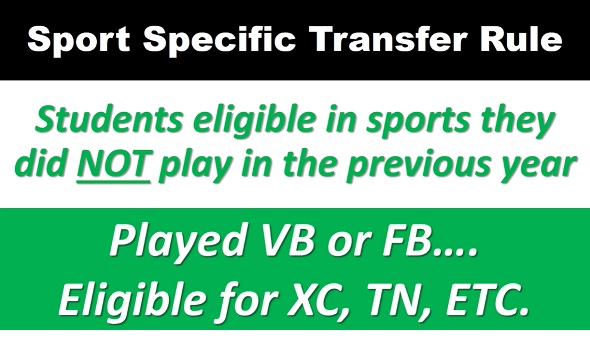
MHSAA Women In Sports Leadership Conference to Celebrate Multiple Milestones
By
Geoff Kimmerly
MHSAA.com senior editor
September 14, 2022
A pair of milestones will be celebrated by the Michigan High School Athletic Association during this year’s Women In Sports Leadership Conference, to be presented Sunday, Oct. 9, and Monday, Oct. 10 at Crowne Plaza Lansing West for 600 participants, most of them high school female student-athletes from across the state.
A theme of “Power of the Past – Force of the Future” will recall opportunities created during the 50 years since the enactment of Title IX in 1972. This also will be the 25th WISL Conference, which remains the first, largest and longest-running program of its type in the country.
This year’s edition again will feature three keynote speakers and a variety of workshops. The opening address will be delivered by Ashley Baker, who serves as the chief diversity, equity and inclusion (DEI) officer at Michigan State University. Baker, originally from Pontiac, earned bachelor and master’s degrees from Bowling Green State University and a doctorate in sport management and policy from the University of Georgia. She came to MSU in December 2020 from Xavier University (Louisiana) where she most recently had served as assistant vice president for student affairs and chief inclusion officer/deputy Title IX coordinator.
First-year Spartans softball coach Sharonda McDonald-Kelley will speak during the Oct. 9 evening general session. She coached Campbell University (N.C.) to back-to-back NCAA Tournament appearances and was a four-time all-Big 12 selection as a player at Texas A&M, appearing in the College World Series before playing professionally for seven years. McDonald-Kelley was named Big South Conference Coach of the Year in 2021, and previously also coached professionally and as associate head coach at Texas Tech University after serving as an assistant for multiple prestigious college programs.
University of Michigan women’s basketball coach Kim Barnes-Arico will speak during the morning session Oct. 10. She led the Wolverines last season to their first NCAA Tournament Elite Eight and is nearing 500 career victories, having won a U-M program-record 218 during her 10 seasons. She’s a two-time Big Ten Conference Coach of Year and was a semifinalist this past season for the Werner Ladder Naismith Coach of the Year honor. Michigan is her fifth college coaching stop; she came to Ann Arbor after 10 seasons at St. John’s. She played basketball one season at Stony Brook University (N.Y.) and then her final three including two as captain at Montclair State University (N.J.).
Workshops offered during the WISL Conference include topics on coaching, teaching and learning leadership; sports nutrition and performance, and injury prevention; and empowerment and goal-setting. Presenters are accomplished in their fields and represent a wide range of backgrounds in sport.
A complete itinerary is available on the MHSAA Website.
The Oct. 9 evening general session also will include recognition for the 2022 Women In Sports Leadership Award winner – recently-retired Livonia Stevenson athletic director Lori Hyman. A basketball standout at MSU during the second half of the 1970s, Hyman went on to coach college basketball for 17 years and then serve as a highly-regarded athletic director for 27 years including the last 22 at her alma mater Stevenson.
Follow the #WISL hashtag on Twitter and Instagram to learn more about the conference’s activities.

Brush Up on the New Transfer Rule
July 18, 2019
By Rob Kaminski
MHSAA benchmarks editor
Eligibility under the new “sport-specific” transfer rule begins this coming fall after circulating extensively for nearly one school year.
Unless one of the stated 15 exceptions is met, participation during the 2018-19 school year determines eligibility for 2019-20.
The new rule adopted by the Representative Council at its May 2018 meeting has found support among most audiences. A transfer student’s eligibility in 2019-20 is based upon that student’s participation from this past school year (2018-19). It will be paramount for administrators and coaches to have awareness of the sports a transfer student participated in during the previous school year.
The long-standing 15 Exceptions to immediate eligibility, such as a full and complete residential change or a student moving between divorced parents by completing of an Educational Transfer Form, did not change.
One might call the rule on the way out “The Fourth-Friday Transfer Rule.” Under this old rule, when a student enrolled at the new school determined his or her eligibility. Under the new Sport Specific Transfer rule, what a student played in the previous season determines eligibility.
The Council passed a more lenient rule on the one hand and more restrictive on the other. The more lenient aspect is a change that finds a transfer student ELIGIBLE in any sport in which he or she did not participate in a game or a scrimmage in the previous school year.
The more restrictive portion tends to discourage students who change schools for sports reasons. A transfer student who did play a sport in the previous season – and who does not meet one of the 15 Exceptions – is NOT ELIGIBLE in that sport for the next season. If a student changes schools in mid-season, the student would be ineligible for the rest of that season in that sport and the next season for that sport.
Participation under this and other rules means playing in an interscholastic game or scrimmage after starting the 9th grade at any high school. It does not mean practice, but entering an interscholastic game, meet or scrimmage in any way. It also may involve more than one sport, so a three-sport athlete who does not have a residential change and transfers would be ineligible in those sports during the next school year – but eligible for any other sport. It also means a student cut from a team – one who never entered a scrimmage or game – may transfer and play without delay for that new school’s team. It may also mean that a student who meets one of the stated exceptions such as a residential change but enrolls in a school other than her or his school of residence, would have eligibility in sports not played in the previous year.
The new rule will tend to discourage students from changing schools for sports because they would be ineligible in any sport they have played in school the previous season for that sport. It will increase participation for some students who were otherwise not eligible under the current rule.
It is always best to contact school athletic directors who can connect with the MHSAA to verify eligibility prior to enrollment.
If the student’s new school requests in writing, the MHSAA Executive Committee may approve a waiver that reduces the period of ineligibility to 90 scheduled school days at the new school if the change of schools was for compelling reasons demonstrated with outside documentation having nothing to do with sports, curriculum, finances, and school demographics. The Executives Committee also has authority to approve immediate eligibility.

